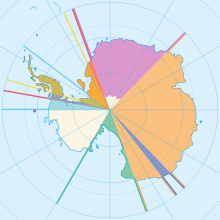- Colonization of Antarctica
-
Colonization of Antarctica refers to having humans including families living permanently on the continent of Antarctica. Currently only some scientists live there temporarily. Antarctica is the only continent on Earth without indigenous human inhabitants.
At present scientists and staff from 30 countries live on about seventy bases (40 year-round and 30 summer-only), with an approximate population of 4000 in summer and 1000 in winter. There have been at least three births in Antarctica, at an Argentine base (1) and a Chilean base (2); see Demographics of Antarctica
 Territorial claims of Antarctica according to the Antarctic Treaty:
Territorial claims of Antarctica according to the Antarctic Treaty:
Contents
Past colonization speculation
An idea common in the 1950s was to have Antarctic cities enclosed under glass domes (Domed city) which would make colonization of this continent possible. Power and temperature regulation of the domes would come from atomic driven generators outside of these domes. A light source at the top of the central tower had been proposed as an artificial sun during the dark months in Antarctica. This scenario would also include regular trans-Antarctic flights as well as mining towns which were dug into Antarctica's ice caps above the shafts down to mineral bearing mountains; however, there are problems with the idea of having an atomic driven generator giving the power and temperature regulation. The atomic reactor at McMurdo Station became a pollution hazard and hence was closed down long ago.[1]
The Antarctic Treaty System, a series of international agreements, presently limit activities on Antarctica. It would need to be modified or abandoned before large-scale colonization could legally occur. On the other hand, it is the very impracticability of permanent colonization that has contributed to the failure of any of the territorial claims to receive international recognition.[2]
Domed cities
Buckminster Fuller, the developer of the geodesic dome, had raised the possibility of Antarctic domed cities that would allow a controlled climate and buildings erected under the dome.[3] His first specific published proposal for a domed city in 1965 discussed the Antarctic as a likely first location for such a project.[4] The second base at Amundsen-Scott South Pole Station (operated 1975-2003) resembles a reduced version of this idea; it is only large enough to cover a few scientific buildings.
In 1971, a team led by German architect Frei Otto made a feasibility study for an air-supported domed city two kilometers across that could house 40,000 residents.[5] Some authors have recently tried to update the idea.[6]
References
- ^ Elzinga, Aant (1993). "Antarctica: The Construction of a Continent by and For Science". In Elisabeth Crawford, Terry Shinn, & Sverker Sörlin (Eds.), Denationalizing Science: The Contexts of International Scientific Practice, pp. 73-106. Dordrecht: Kluwer.
- ^ Joyner, Christopher C. (1992). Antarctica and the Law of the Sea, p. 49. Martinus Nijhoff Publishers. ISBN 0792318234.
- ^ Marks, Robert W. (Aug. 23, 1959). "The Breakthrough of Buckminster Fuller". The New York Times, pp. SM14, SM15, SM42, SM44.
- ^ Fuller, Buckminster (Sep. 26, 1965). "The Case for Domed Cities". St. Louis Post-Dispatch.
- ^ Walker, Derek (1998). Happold: The Confidence to Build, p. 63. Taylor & Francis. ISBN 0419240705.
- ^ Bolonkin, Alexander A. and Cathcart, Richard B. (May 2007). "Inflatable ‘Evergreen’ dome settlements for Earth’s Polar Regions". Clean Technologies and Environmental Policy 9 (2), 125–132.
See also
- Antarctic territorial claims
- List of research stations in Antarctica
- Demographics of Antarctica
- Esperanza Base
- Ocean colonization
External links
- Frei Otto's domed city design
- Colonize Antarctica, a blog that aims to further the effort to colonize Antarctica.
Colonization policy Earth ExplorationSpace Mercury · Venus · Moon · Lagrangian points · Mars · Phobos · Ceres · Asteroids — Outer Solar System: Jupiter · Europa · Callisto · Saturn · Titan · Uranus · Neptune · trans-Neptunian objects · PlutoGeneral
topicsAntiquity — Imperialism · Chartered companies · Colonialism (chronology · history · empires) — Current: Non-Self-Governing · Dependent · Space Station — Space Militarization · Space CommercializationWars of national liberation — Predecessors of sovereign states (in Europe, in South America) · Sovereign states formation datesOverseas, major: British · Dutch · French · Italian · Portuguese · Spanish
Overseas, minor: Australian · Austria-Hungary · Belgian · Danish · German · New Zealand · Norwegian · Polish-Lithuanian · Swedish · United States
Mostly contiguous: Chinese · Japanese · Russian · Ottoman · South African · IndianCategories:
Wikimedia Foundation. 2010.
